Entrepreneurship and Small Business Management
VerifiedAdded on 2023/01/16
|14
|4067
|85
AI Summary
This study material provides an in-depth understanding of entrepreneurship and small business management. It covers topics such as different types of entrepreneurial ventures, their relation with typology of entrepreneurship, similarities and differences between entrepreneurial ventures, impact of micro and small businesses on the economy, importance of small businesses and business start-ups to the growth of social economy, characteristic traits and skills of successful entrepreneurs, and aspects of entrepreneurial personality that reflect entrepreneurial motivation and mindset.
Contribute Materials
Your contribution can guide someone’s learning journey. Share your
documents today.

Entrepreneurship and Small
Business Management
Business Management
Secure Best Marks with AI Grader
Need help grading? Try our AI Grader for instant feedback on your assignments.
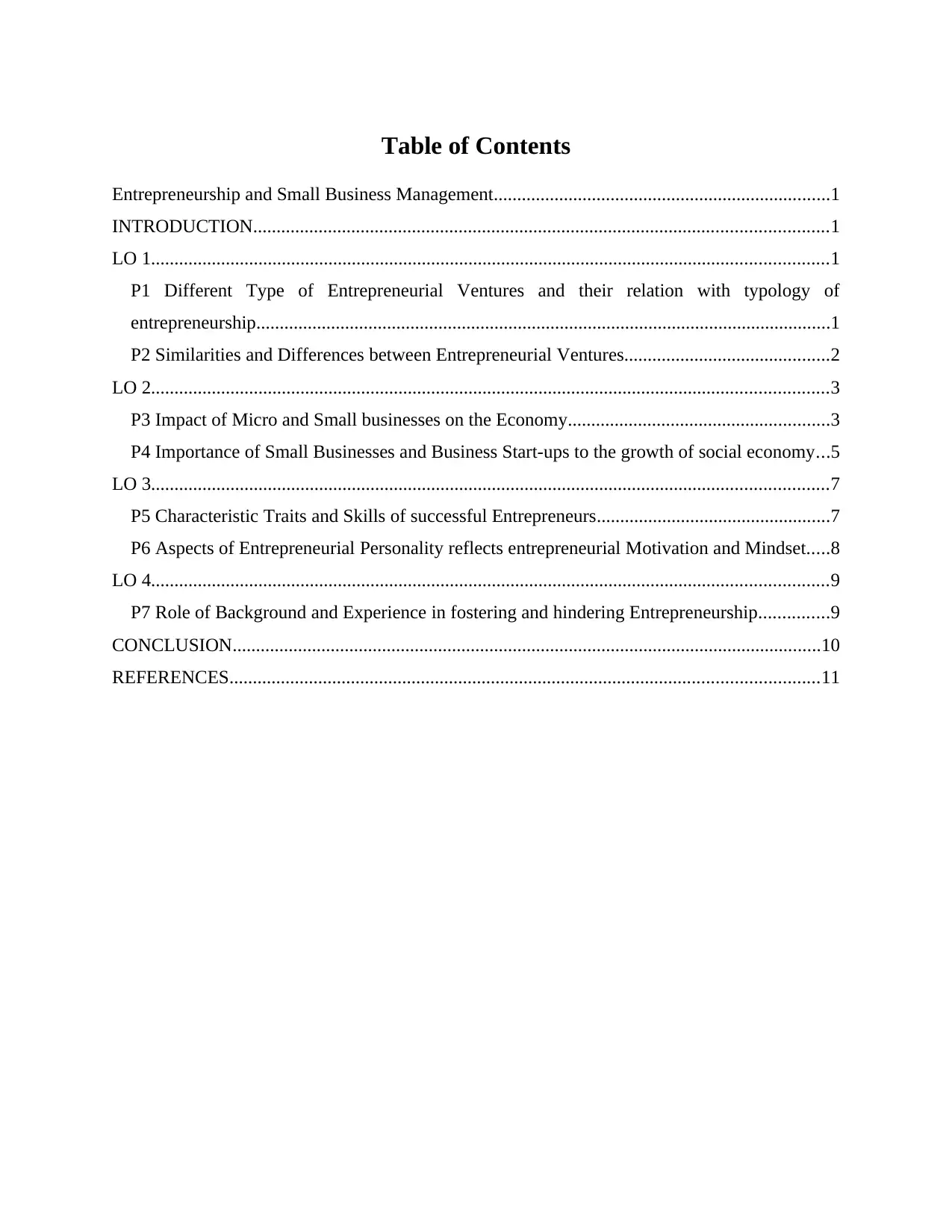
Table of Contents
Entrepreneurship and Small Business Management........................................................................1
INTRODUCTION...........................................................................................................................1
LO 1.................................................................................................................................................1
P1 Different Type of Entrepreneurial Ventures and their relation with typology of
entrepreneurship...........................................................................................................................1
P2 Similarities and Differences between Entrepreneurial Ventures............................................2
LO 2.................................................................................................................................................3
P3 Impact of Micro and Small businesses on the Economy........................................................3
P4 Importance of Small Businesses and Business Start-ups to the growth of social economy...5
LO 3.................................................................................................................................................7
P5 Characteristic Traits and Skills of successful Entrepreneurs..................................................7
P6 Aspects of Entrepreneurial Personality reflects entrepreneurial Motivation and Mindset.....8
LO 4.................................................................................................................................................9
P7 Role of Background and Experience in fostering and hindering Entrepreneurship...............9
CONCLUSION..............................................................................................................................10
REFERENCES..............................................................................................................................11
Entrepreneurship and Small Business Management........................................................................1
INTRODUCTION...........................................................................................................................1
LO 1.................................................................................................................................................1
P1 Different Type of Entrepreneurial Ventures and their relation with typology of
entrepreneurship...........................................................................................................................1
P2 Similarities and Differences between Entrepreneurial Ventures............................................2
LO 2.................................................................................................................................................3
P3 Impact of Micro and Small businesses on the Economy........................................................3
P4 Importance of Small Businesses and Business Start-ups to the growth of social economy...5
LO 3.................................................................................................................................................7
P5 Characteristic Traits and Skills of successful Entrepreneurs..................................................7
P6 Aspects of Entrepreneurial Personality reflects entrepreneurial Motivation and Mindset.....8
LO 4.................................................................................................................................................9
P7 Role of Background and Experience in fostering and hindering Entrepreneurship...............9
CONCLUSION..............................................................................................................................10
REFERENCES..............................................................................................................................11
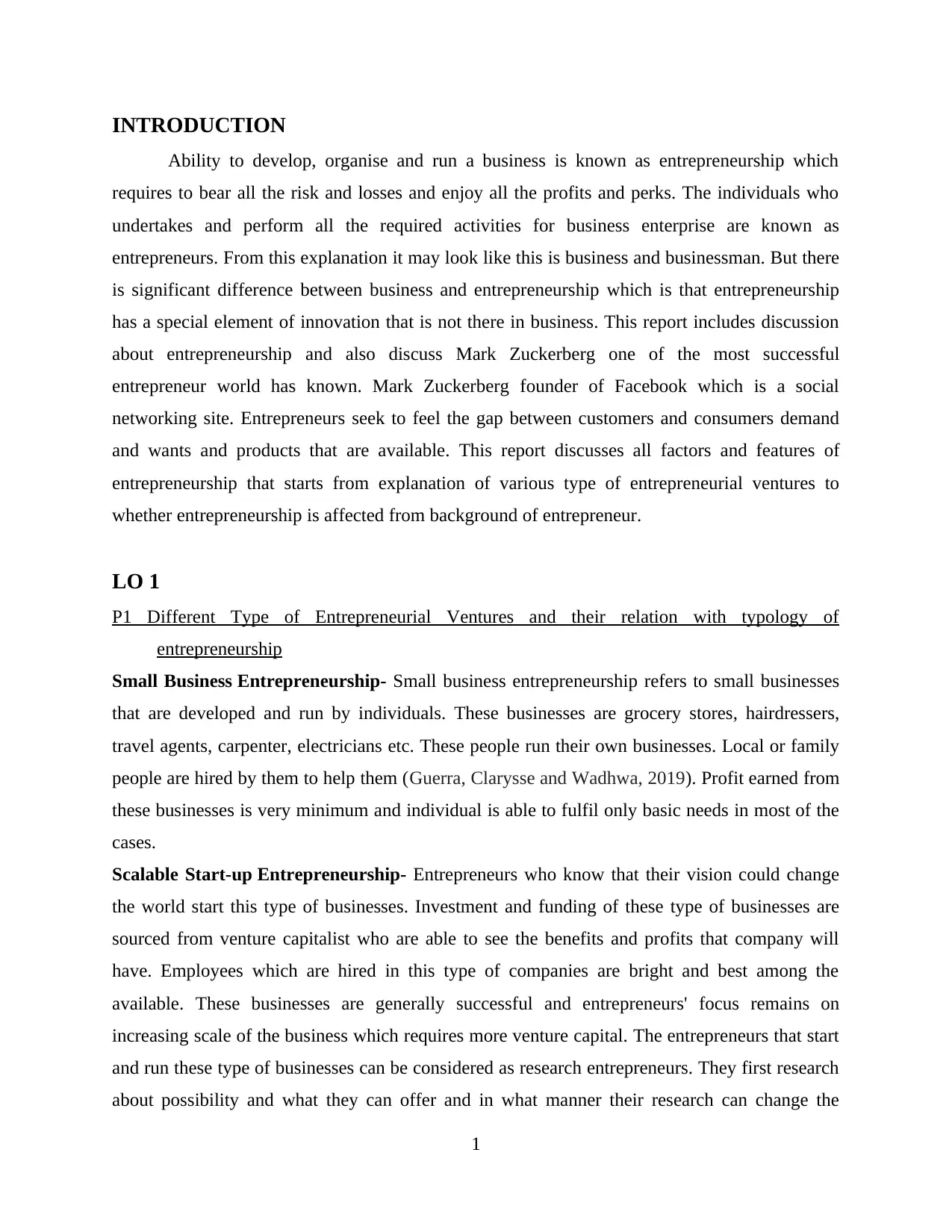
INTRODUCTION
Ability to develop, organise and run a business is known as entrepreneurship which
requires to bear all the risk and losses and enjoy all the profits and perks. The individuals who
undertakes and perform all the required activities for business enterprise are known as
entrepreneurs. From this explanation it may look like this is business and businessman. But there
is significant difference between business and entrepreneurship which is that entrepreneurship
has a special element of innovation that is not there in business. This report includes discussion
about entrepreneurship and also discuss Mark Zuckerberg one of the most successful
entrepreneur world has known. Mark Zuckerberg founder of Facebook which is a social
networking site. Entrepreneurs seek to feel the gap between customers and consumers demand
and wants and products that are available. This report discusses all factors and features of
entrepreneurship that starts from explanation of various type of entrepreneurial ventures to
whether entrepreneurship is affected from background of entrepreneur.
LO 1
P1 Different Type of Entrepreneurial Ventures and their relation with typology of
entrepreneurship
Small Business Entrepreneurship- Small business entrepreneurship refers to small businesses
that are developed and run by individuals. These businesses are grocery stores, hairdressers,
travel agents, carpenter, electricians etc. These people run their own businesses. Local or family
people are hired by them to help them (Guerra, Clarysse and Wadhwa, 2019). Profit earned from
these businesses is very minimum and individual is able to fulfil only basic needs in most of the
cases.
Scalable Start-up Entrepreneurship- Entrepreneurs who know that their vision could change
the world start this type of businesses. Investment and funding of these type of businesses are
sourced from venture capitalist who are able to see the benefits and profits that company will
have. Employees which are hired in this type of companies are bright and best among the
available. These businesses are generally successful and entrepreneurs' focus remains on
increasing scale of the business which requires more venture capital. The entrepreneurs that start
and run these type of businesses can be considered as research entrepreneurs. They first research
about possibility and what they can offer and in what manner their research can change the
1
Ability to develop, organise and run a business is known as entrepreneurship which
requires to bear all the risk and losses and enjoy all the profits and perks. The individuals who
undertakes and perform all the required activities for business enterprise are known as
entrepreneurs. From this explanation it may look like this is business and businessman. But there
is significant difference between business and entrepreneurship which is that entrepreneurship
has a special element of innovation that is not there in business. This report includes discussion
about entrepreneurship and also discuss Mark Zuckerberg one of the most successful
entrepreneur world has known. Mark Zuckerberg founder of Facebook which is a social
networking site. Entrepreneurs seek to feel the gap between customers and consumers demand
and wants and products that are available. This report discusses all factors and features of
entrepreneurship that starts from explanation of various type of entrepreneurial ventures to
whether entrepreneurship is affected from background of entrepreneur.
LO 1
P1 Different Type of Entrepreneurial Ventures and their relation with typology of
entrepreneurship
Small Business Entrepreneurship- Small business entrepreneurship refers to small businesses
that are developed and run by individuals. These businesses are grocery stores, hairdressers,
travel agents, carpenter, electricians etc. These people run their own businesses. Local or family
people are hired by them to help them (Guerra, Clarysse and Wadhwa, 2019). Profit earned from
these businesses is very minimum and individual is able to fulfil only basic needs in most of the
cases.
Scalable Start-up Entrepreneurship- Entrepreneurs who know that their vision could change
the world start this type of businesses. Investment and funding of these type of businesses are
sourced from venture capitalist who are able to see the benefits and profits that company will
have. Employees which are hired in this type of companies are bright and best among the
available. These businesses are generally successful and entrepreneurs' focus remains on
increasing scale of the business which requires more venture capital. The entrepreneurs that start
and run these type of businesses can be considered as research entrepreneurs. They first research
about possibility and what they can offer and in what manner their research can change the
1
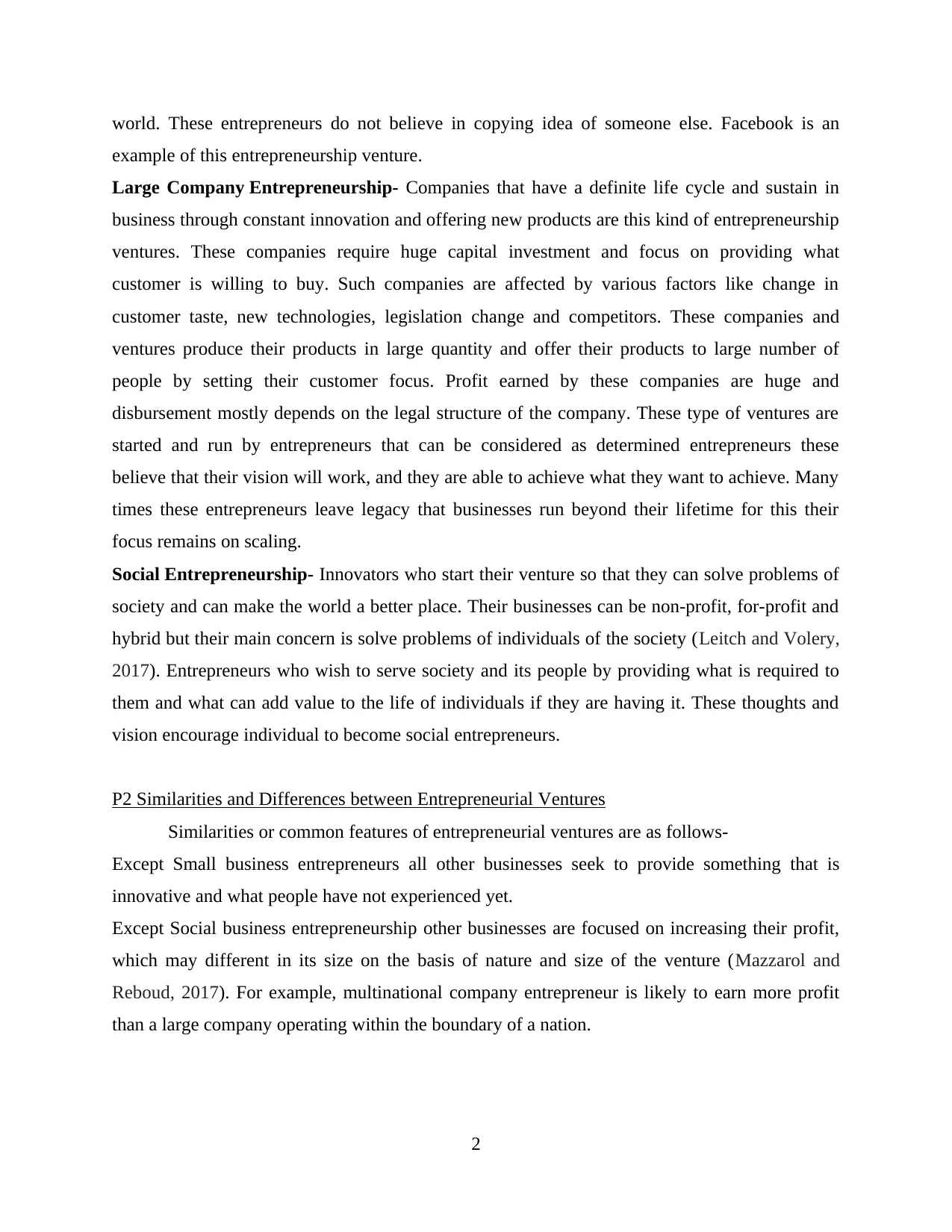
world. These entrepreneurs do not believe in copying idea of someone else. Facebook is an
example of this entrepreneurship venture.
Large Company Entrepreneurship- Companies that have a definite life cycle and sustain in
business through constant innovation and offering new products are this kind of entrepreneurship
ventures. These companies require huge capital investment and focus on providing what
customer is willing to buy. Such companies are affected by various factors like change in
customer taste, new technologies, legislation change and competitors. These companies and
ventures produce their products in large quantity and offer their products to large number of
people by setting their customer focus. Profit earned by these companies are huge and
disbursement mostly depends on the legal structure of the company. These type of ventures are
started and run by entrepreneurs that can be considered as determined entrepreneurs these
believe that their vision will work, and they are able to achieve what they want to achieve. Many
times these entrepreneurs leave legacy that businesses run beyond their lifetime for this their
focus remains on scaling.
Social Entrepreneurship- Innovators who start their venture so that they can solve problems of
society and can make the world a better place. Their businesses can be non-profit, for-profit and
hybrid but their main concern is solve problems of individuals of the society (Leitch and Volery,
2017). Entrepreneurs who wish to serve society and its people by providing what is required to
them and what can add value to the life of individuals if they are having it. These thoughts and
vision encourage individual to become social entrepreneurs.
P2 Similarities and Differences between Entrepreneurial Ventures
Similarities or common features of entrepreneurial ventures are as follows-
Except Small business entrepreneurs all other businesses seek to provide something that is
innovative and what people have not experienced yet.
Except Social business entrepreneurship other businesses are focused on increasing their profit,
which may different in its size on the basis of nature and size of the venture (Mazzarol and
Reboud, 2017). For example, multinational company entrepreneur is likely to earn more profit
than a large company operating within the boundary of a nation.
2
example of this entrepreneurship venture.
Large Company Entrepreneurship- Companies that have a definite life cycle and sustain in
business through constant innovation and offering new products are this kind of entrepreneurship
ventures. These companies require huge capital investment and focus on providing what
customer is willing to buy. Such companies are affected by various factors like change in
customer taste, new technologies, legislation change and competitors. These companies and
ventures produce their products in large quantity and offer their products to large number of
people by setting their customer focus. Profit earned by these companies are huge and
disbursement mostly depends on the legal structure of the company. These type of ventures are
started and run by entrepreneurs that can be considered as determined entrepreneurs these
believe that their vision will work, and they are able to achieve what they want to achieve. Many
times these entrepreneurs leave legacy that businesses run beyond their lifetime for this their
focus remains on scaling.
Social Entrepreneurship- Innovators who start their venture so that they can solve problems of
society and can make the world a better place. Their businesses can be non-profit, for-profit and
hybrid but their main concern is solve problems of individuals of the society (Leitch and Volery,
2017). Entrepreneurs who wish to serve society and its people by providing what is required to
them and what can add value to the life of individuals if they are having it. These thoughts and
vision encourage individual to become social entrepreneurs.
P2 Similarities and Differences between Entrepreneurial Ventures
Similarities or common features of entrepreneurial ventures are as follows-
Except Small business entrepreneurs all other businesses seek to provide something that is
innovative and what people have not experienced yet.
Except Social business entrepreneurship other businesses are focused on increasing their profit,
which may different in its size on the basis of nature and size of the venture (Mazzarol and
Reboud, 2017). For example, multinational company entrepreneur is likely to earn more profit
than a large company operating within the boundary of a nation.
2
Secure Best Marks with AI Grader
Need help grading? Try our AI Grader for instant feedback on your assignments.
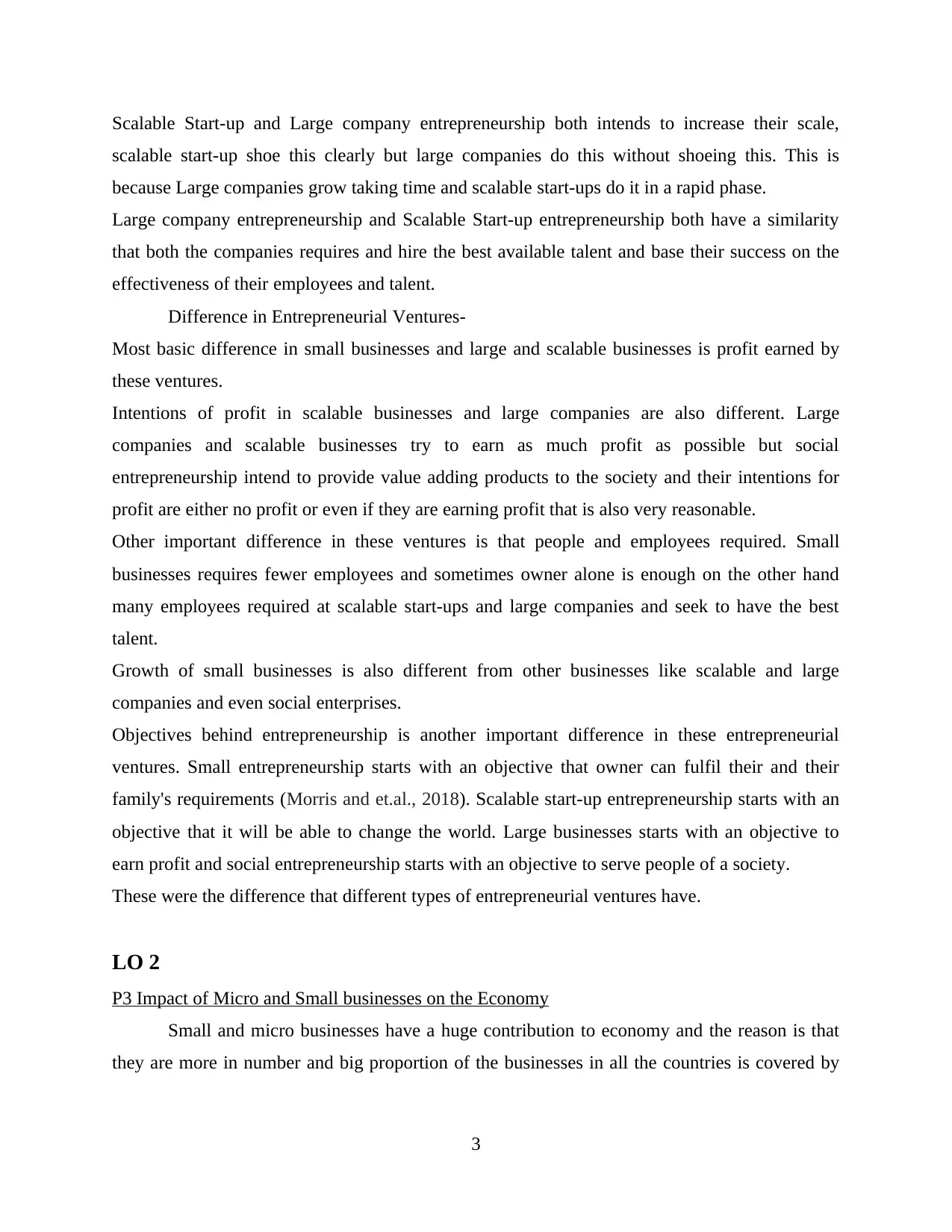
Scalable Start-up and Large company entrepreneurship both intends to increase their scale,
scalable start-up shoe this clearly but large companies do this without shoeing this. This is
because Large companies grow taking time and scalable start-ups do it in a rapid phase.
Large company entrepreneurship and Scalable Start-up entrepreneurship both have a similarity
that both the companies requires and hire the best available talent and base their success on the
effectiveness of their employees and talent.
Difference in Entrepreneurial Ventures-
Most basic difference in small businesses and large and scalable businesses is profit earned by
these ventures.
Intentions of profit in scalable businesses and large companies are also different. Large
companies and scalable businesses try to earn as much profit as possible but social
entrepreneurship intend to provide value adding products to the society and their intentions for
profit are either no profit or even if they are earning profit that is also very reasonable.
Other important difference in these ventures is that people and employees required. Small
businesses requires fewer employees and sometimes owner alone is enough on the other hand
many employees required at scalable start-ups and large companies and seek to have the best
talent.
Growth of small businesses is also different from other businesses like scalable and large
companies and even social enterprises.
Objectives behind entrepreneurship is another important difference in these entrepreneurial
ventures. Small entrepreneurship starts with an objective that owner can fulfil their and their
family's requirements (Morris and et.al., 2018). Scalable start-up entrepreneurship starts with an
objective that it will be able to change the world. Large businesses starts with an objective to
earn profit and social entrepreneurship starts with an objective to serve people of a society.
These were the difference that different types of entrepreneurial ventures have.
LO 2
P3 Impact of Micro and Small businesses on the Economy
Small and micro businesses have a huge contribution to economy and the reason is that
they are more in number and big proportion of the businesses in all the countries is covered by
3
scalable start-up shoe this clearly but large companies do this without shoeing this. This is
because Large companies grow taking time and scalable start-ups do it in a rapid phase.
Large company entrepreneurship and Scalable Start-up entrepreneurship both have a similarity
that both the companies requires and hire the best available talent and base their success on the
effectiveness of their employees and talent.
Difference in Entrepreneurial Ventures-
Most basic difference in small businesses and large and scalable businesses is profit earned by
these ventures.
Intentions of profit in scalable businesses and large companies are also different. Large
companies and scalable businesses try to earn as much profit as possible but social
entrepreneurship intend to provide value adding products to the society and their intentions for
profit are either no profit or even if they are earning profit that is also very reasonable.
Other important difference in these ventures is that people and employees required. Small
businesses requires fewer employees and sometimes owner alone is enough on the other hand
many employees required at scalable start-ups and large companies and seek to have the best
talent.
Growth of small businesses is also different from other businesses like scalable and large
companies and even social enterprises.
Objectives behind entrepreneurship is another important difference in these entrepreneurial
ventures. Small entrepreneurship starts with an objective that owner can fulfil their and their
family's requirements (Morris and et.al., 2018). Scalable start-up entrepreneurship starts with an
objective that it will be able to change the world. Large businesses starts with an objective to
earn profit and social entrepreneurship starts with an objective to serve people of a society.
These were the difference that different types of entrepreneurial ventures have.
LO 2
P3 Impact of Micro and Small businesses on the Economy
Small and micro businesses have a huge contribution to economy and the reason is that
they are more in number and big proportion of the businesses in all the countries is covered by
3

small businesses. Small and Micro businesses contribute around 55 percent of total GDP, 60 to
70 percent of employment and 90 percent of business population.
This illustration present data about individual who are engaged in various type of businesses and
among them businesses that requires 0 to 1 employees are highest in quantity. These are
followed by businesses which requires 2 to 4 employees and the number of businesses keep
falling respectively as the number of employees required increases. Businesses which requires
200 to 249 employees are least and businesses that requires 500 and more employees are 3 last.
These businesses are companies and similar big business organisations. Data presented through
this illustration in form of information belongs to businesses of the UK.
4
Illustration 1: Impact of micro and small businesses on economy.
Small Businesses, 2018.
70 percent of employment and 90 percent of business population.
This illustration present data about individual who are engaged in various type of businesses and
among them businesses that requires 0 to 1 employees are highest in quantity. These are
followed by businesses which requires 2 to 4 employees and the number of businesses keep
falling respectively as the number of employees required increases. Businesses which requires
200 to 249 employees are least and businesses that requires 500 and more employees are 3 last.
These businesses are companies and similar big business organisations. Data presented through
this illustration in form of information belongs to businesses of the UK.
4
Illustration 1: Impact of micro and small businesses on economy.
Small Businesses, 2018.
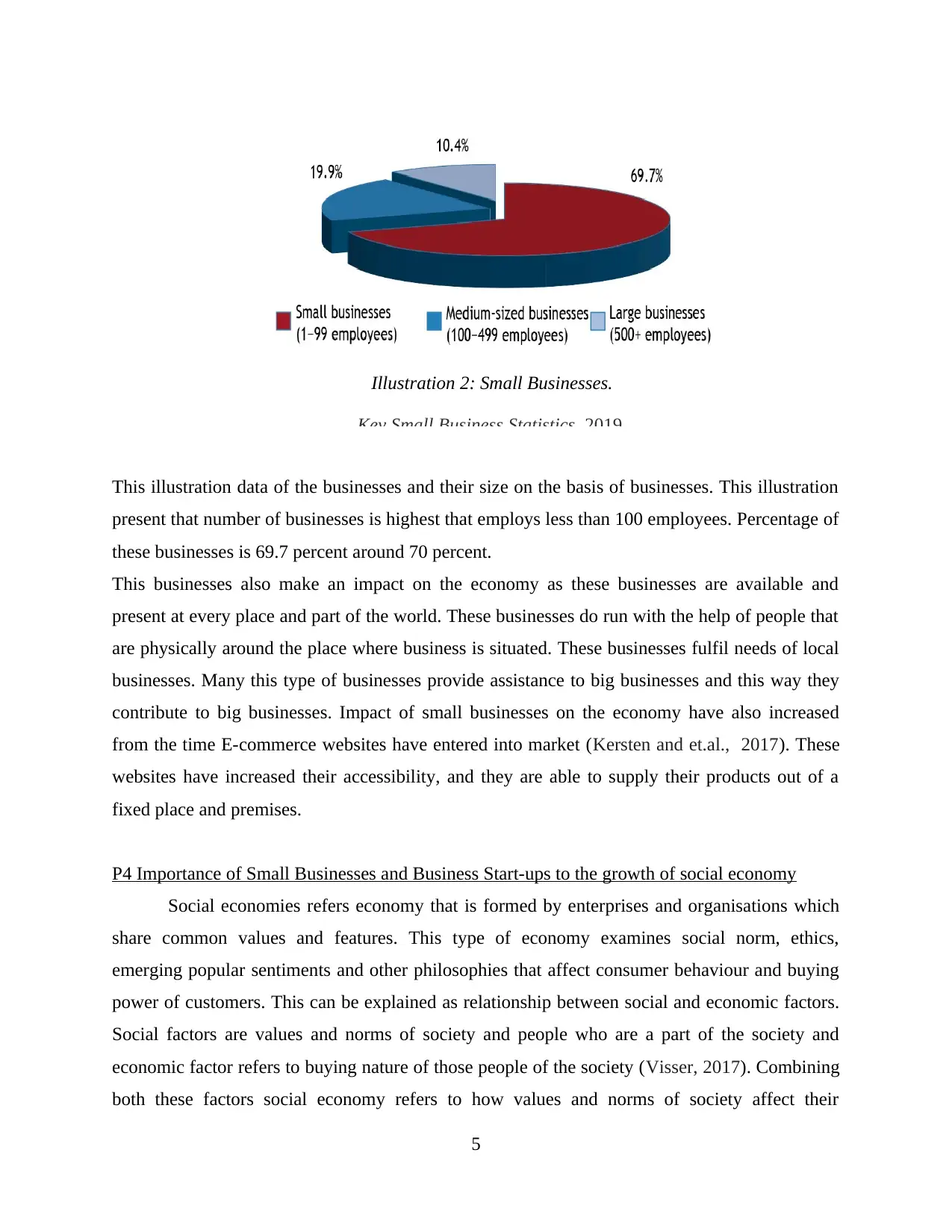
This illustration data of the businesses and their size on the basis of businesses. This illustration
present that number of businesses is highest that employs less than 100 employees. Percentage of
these businesses is 69.7 percent around 70 percent.
This businesses also make an impact on the economy as these businesses are available and
present at every place and part of the world. These businesses do run with the help of people that
are physically around the place where business is situated. These businesses fulfil needs of local
businesses. Many this type of businesses provide assistance to big businesses and this way they
contribute to big businesses. Impact of small businesses on the economy have also increased
from the time E-commerce websites have entered into market (Kersten and et.al., 2017). These
websites have increased their accessibility, and they are able to supply their products out of a
fixed place and premises.
P4 Importance of Small Businesses and Business Start-ups to the growth of social economy
Social economies refers economy that is formed by enterprises and organisations which
share common values and features. This type of economy examines social norm, ethics,
emerging popular sentiments and other philosophies that affect consumer behaviour and buying
power of customers. This can be explained as relationship between social and economic factors.
Social factors are values and norms of society and people who are a part of the society and
economic factor refers to buying nature of those people of the society (Visser, 2017). Combining
both these factors social economy refers to how values and norms of society affect their
5
Illustration 2: Small Businesses.
Key Small Business Statistics, 2019.
present that number of businesses is highest that employs less than 100 employees. Percentage of
these businesses is 69.7 percent around 70 percent.
This businesses also make an impact on the economy as these businesses are available and
present at every place and part of the world. These businesses do run with the help of people that
are physically around the place where business is situated. These businesses fulfil needs of local
businesses. Many this type of businesses provide assistance to big businesses and this way they
contribute to big businesses. Impact of small businesses on the economy have also increased
from the time E-commerce websites have entered into market (Kersten and et.al., 2017). These
websites have increased their accessibility, and they are able to supply their products out of a
fixed place and premises.
P4 Importance of Small Businesses and Business Start-ups to the growth of social economy
Social economies refers economy that is formed by enterprises and organisations which
share common values and features. This type of economy examines social norm, ethics,
emerging popular sentiments and other philosophies that affect consumer behaviour and buying
power of customers. This can be explained as relationship between social and economic factors.
Social factors are values and norms of society and people who are a part of the society and
economic factor refers to buying nature of those people of the society (Visser, 2017). Combining
both these factors social economy refers to how values and norms of society affect their
5
Illustration 2: Small Businesses.
Key Small Business Statistics, 2019.
Paraphrase This Document
Need a fresh take? Get an instant paraphrase of this document with our AI Paraphraser

decisions about buying. Importance of the small business and Start-up businesses to growth of
social economy is as follows-
Providing services that are required to and affordable to society
Small businesses that operate a small level do have correct idea about the requirements of
the people in a society and these business owners know what is the status of the people at a
particular place where they are working and what kind of thing individuals can buy (Vezina,
MALO and Ben Selma, 2017). This businesses then provide things accordingly to their
customers.
Special focus on Environment
Small business and start-ups do have a special focus for the environment whereas big
companies' affecting environment negatively. This is the reason that small businesses and start-
ups are liked by people as they do not harm environment.
Chances of unethical practices are reduced
Small-business and start-ups are operated and managed by less people resulting in less
influence on business practices. This result in reduced risk of unethical practices being employed
at small businesses. This is an important factor and is an significant contributor in social
economy. Reason behind this is that social economy focus on ethical practices and small and
start-ups are also ethical in nature.
Employment to Local People
Social economy focus on well-being of individuals rather than increase in profit (Taylor,
2018). Small businesses usually hire local people that shows their concern for people and not for
profit, local people may not always be as competent as required but still they are hired by small
businesses and start-ups.
Increasing Taxation for Local Government
Small-businesses and start-ups increase taxation for government and that government can
use for social causes of local people. This is also an important contribution for growth of social
economy.
6
social economy is as follows-
Providing services that are required to and affordable to society
Small businesses that operate a small level do have correct idea about the requirements of
the people in a society and these business owners know what is the status of the people at a
particular place where they are working and what kind of thing individuals can buy (Vezina,
MALO and Ben Selma, 2017). This businesses then provide things accordingly to their
customers.
Special focus on Environment
Small business and start-ups do have a special focus for the environment whereas big
companies' affecting environment negatively. This is the reason that small businesses and start-
ups are liked by people as they do not harm environment.
Chances of unethical practices are reduced
Small-business and start-ups are operated and managed by less people resulting in less
influence on business practices. This result in reduced risk of unethical practices being employed
at small businesses. This is an important factor and is an significant contributor in social
economy. Reason behind this is that social economy focus on ethical practices and small and
start-ups are also ethical in nature.
Employment to Local People
Social economy focus on well-being of individuals rather than increase in profit (Taylor,
2018). Small businesses usually hire local people that shows their concern for people and not for
profit, local people may not always be as competent as required but still they are hired by small
businesses and start-ups.
Increasing Taxation for Local Government
Small-businesses and start-ups increase taxation for government and that government can
use for social causes of local people. This is also an important contribution for growth of social
economy.
6
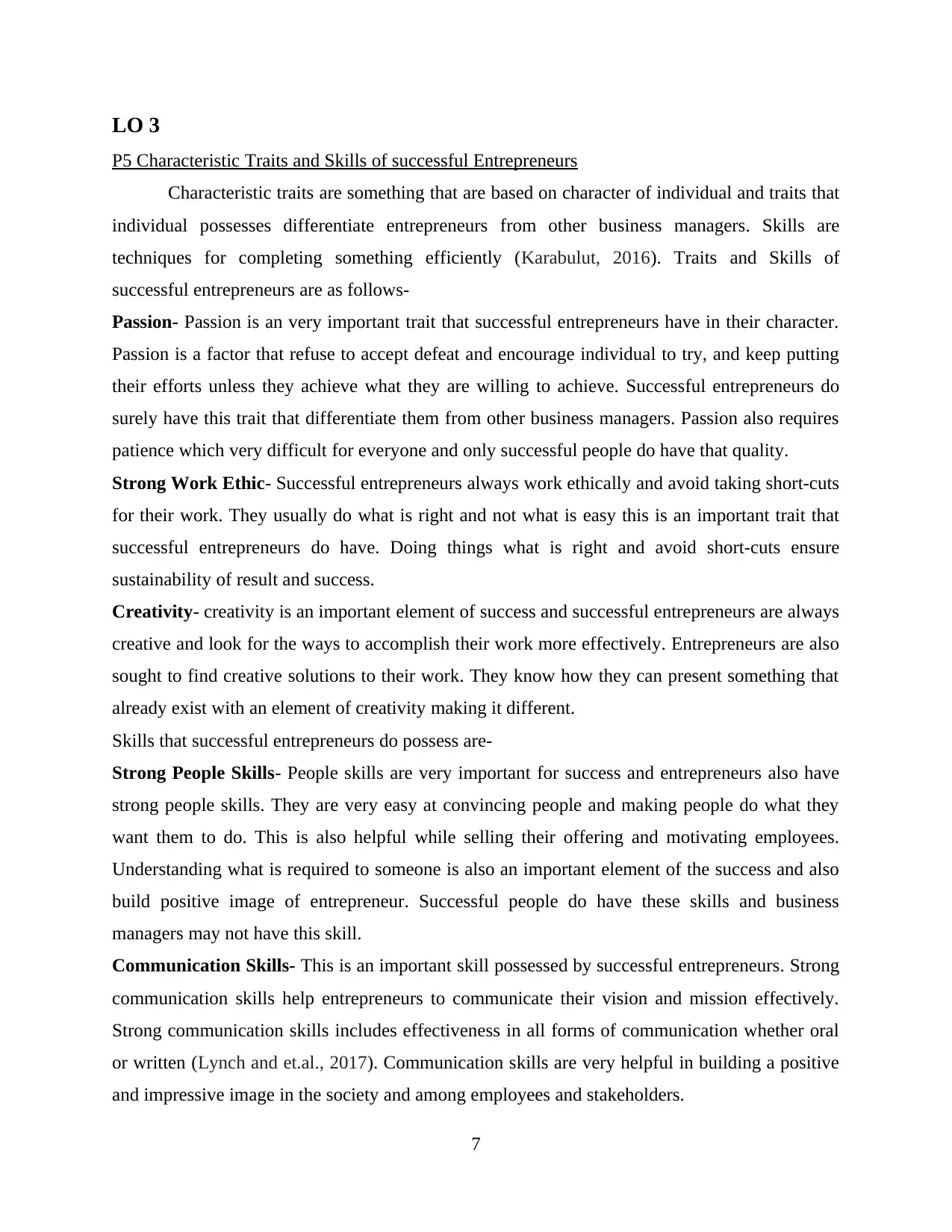
LO 3
P5 Characteristic Traits and Skills of successful Entrepreneurs
Characteristic traits are something that are based on character of individual and traits that
individual possesses differentiate entrepreneurs from other business managers. Skills are
techniques for completing something efficiently (Karabulut, 2016). Traits and Skills of
successful entrepreneurs are as follows-
Passion- Passion is an very important trait that successful entrepreneurs have in their character.
Passion is a factor that refuse to accept defeat and encourage individual to try, and keep putting
their efforts unless they achieve what they are willing to achieve. Successful entrepreneurs do
surely have this trait that differentiate them from other business managers. Passion also requires
patience which very difficult for everyone and only successful people do have that quality.
Strong Work Ethic- Successful entrepreneurs always work ethically and avoid taking short-cuts
for their work. They usually do what is right and not what is easy this is an important trait that
successful entrepreneurs do have. Doing things what is right and avoid short-cuts ensure
sustainability of result and success.
Creativity- creativity is an important element of success and successful entrepreneurs are always
creative and look for the ways to accomplish their work more effectively. Entrepreneurs are also
sought to find creative solutions to their work. They know how they can present something that
already exist with an element of creativity making it different.
Skills that successful entrepreneurs do possess are-
Strong People Skills- People skills are very important for success and entrepreneurs also have
strong people skills. They are very easy at convincing people and making people do what they
want them to do. This is also helpful while selling their offering and motivating employees.
Understanding what is required to someone is also an important element of the success and also
build positive image of entrepreneur. Successful people do have these skills and business
managers may not have this skill.
Communication Skills- This is an important skill possessed by successful entrepreneurs. Strong
communication skills help entrepreneurs to communicate their vision and mission effectively.
Strong communication skills includes effectiveness in all forms of communication whether oral
or written (Lynch and et.al., 2017). Communication skills are very helpful in building a positive
and impressive image in the society and among employees and stakeholders.
7
P5 Characteristic Traits and Skills of successful Entrepreneurs
Characteristic traits are something that are based on character of individual and traits that
individual possesses differentiate entrepreneurs from other business managers. Skills are
techniques for completing something efficiently (Karabulut, 2016). Traits and Skills of
successful entrepreneurs are as follows-
Passion- Passion is an very important trait that successful entrepreneurs have in their character.
Passion is a factor that refuse to accept defeat and encourage individual to try, and keep putting
their efforts unless they achieve what they are willing to achieve. Successful entrepreneurs do
surely have this trait that differentiate them from other business managers. Passion also requires
patience which very difficult for everyone and only successful people do have that quality.
Strong Work Ethic- Successful entrepreneurs always work ethically and avoid taking short-cuts
for their work. They usually do what is right and not what is easy this is an important trait that
successful entrepreneurs do have. Doing things what is right and avoid short-cuts ensure
sustainability of result and success.
Creativity- creativity is an important element of success and successful entrepreneurs are always
creative and look for the ways to accomplish their work more effectively. Entrepreneurs are also
sought to find creative solutions to their work. They know how they can present something that
already exist with an element of creativity making it different.
Skills that successful entrepreneurs do possess are-
Strong People Skills- People skills are very important for success and entrepreneurs also have
strong people skills. They are very easy at convincing people and making people do what they
want them to do. This is also helpful while selling their offering and motivating employees.
Understanding what is required to someone is also an important element of the success and also
build positive image of entrepreneur. Successful people do have these skills and business
managers may not have this skill.
Communication Skills- This is an important skill possessed by successful entrepreneurs. Strong
communication skills help entrepreneurs to communicate their vision and mission effectively.
Strong communication skills includes effectiveness in all forms of communication whether oral
or written (Lynch and et.al., 2017). Communication skills are very helpful in building a positive
and impressive image in the society and among employees and stakeholders.
7
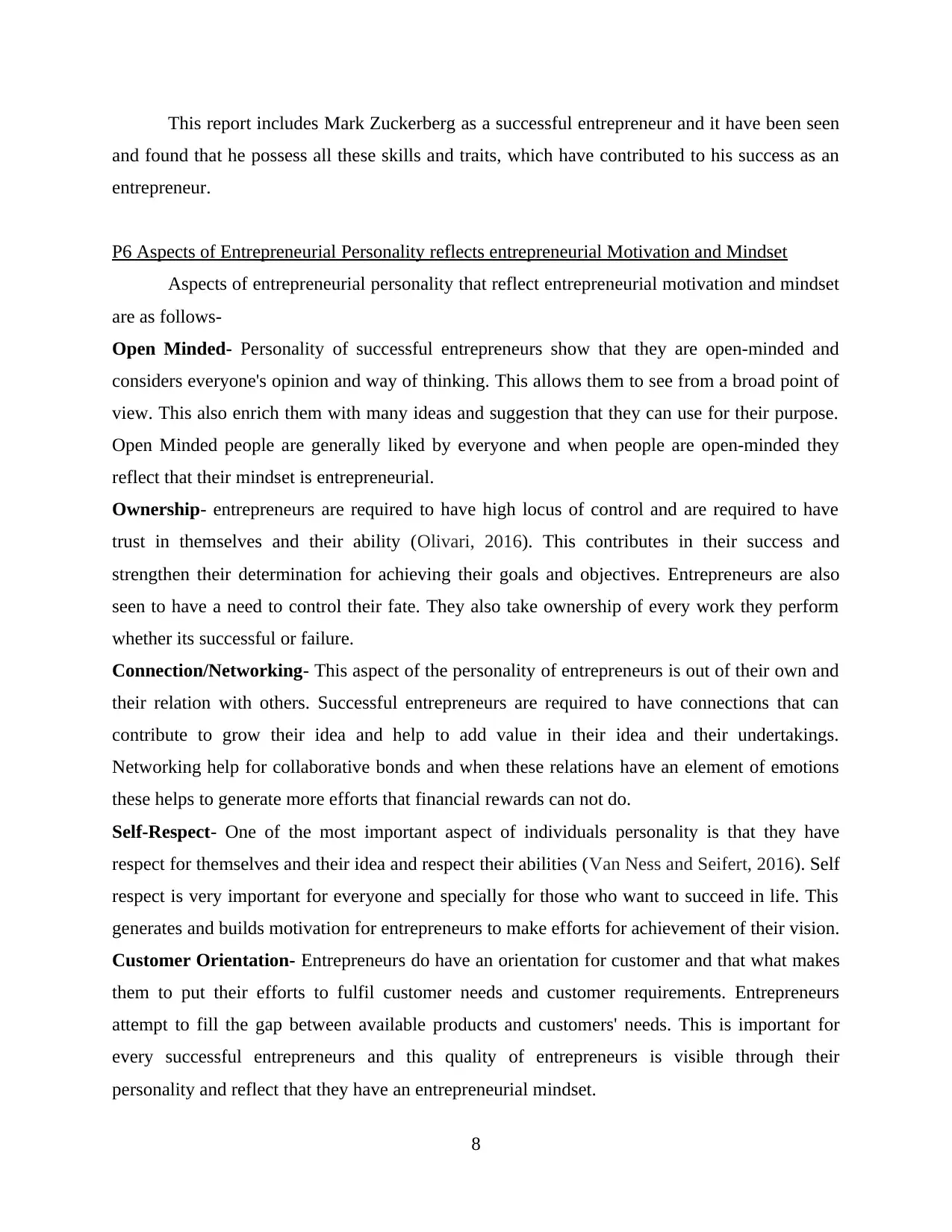
This report includes Mark Zuckerberg as a successful entrepreneur and it have been seen
and found that he possess all these skills and traits, which have contributed to his success as an
entrepreneur.
P6 Aspects of Entrepreneurial Personality reflects entrepreneurial Motivation and Mindset
Aspects of entrepreneurial personality that reflect entrepreneurial motivation and mindset
are as follows-
Open Minded- Personality of successful entrepreneurs show that they are open-minded and
considers everyone's opinion and way of thinking. This allows them to see from a broad point of
view. This also enrich them with many ideas and suggestion that they can use for their purpose.
Open Minded people are generally liked by everyone and when people are open-minded they
reflect that their mindset is entrepreneurial.
Ownership- entrepreneurs are required to have high locus of control and are required to have
trust in themselves and their ability (Olivari, 2016). This contributes in their success and
strengthen their determination for achieving their goals and objectives. Entrepreneurs are also
seen to have a need to control their fate. They also take ownership of every work they perform
whether its successful or failure.
Connection/Networking- This aspect of the personality of entrepreneurs is out of their own and
their relation with others. Successful entrepreneurs are required to have connections that can
contribute to grow their idea and help to add value in their idea and their undertakings.
Networking help for collaborative bonds and when these relations have an element of emotions
these helps to generate more efforts that financial rewards can not do.
Self-Respect- One of the most important aspect of individuals personality is that they have
respect for themselves and their idea and respect their abilities (Van Ness and Seifert, 2016). Self
respect is very important for everyone and specially for those who want to succeed in life. This
generates and builds motivation for entrepreneurs to make efforts for achievement of their vision.
Customer Orientation- Entrepreneurs do have an orientation for customer and that what makes
them to put their efforts to fulfil customer needs and customer requirements. Entrepreneurs
attempt to fill the gap between available products and customers' needs. This is important for
every successful entrepreneurs and this quality of entrepreneurs is visible through their
personality and reflect that they have an entrepreneurial mindset.
8
and found that he possess all these skills and traits, which have contributed to his success as an
entrepreneur.
P6 Aspects of Entrepreneurial Personality reflects entrepreneurial Motivation and Mindset
Aspects of entrepreneurial personality that reflect entrepreneurial motivation and mindset
are as follows-
Open Minded- Personality of successful entrepreneurs show that they are open-minded and
considers everyone's opinion and way of thinking. This allows them to see from a broad point of
view. This also enrich them with many ideas and suggestion that they can use for their purpose.
Open Minded people are generally liked by everyone and when people are open-minded they
reflect that their mindset is entrepreneurial.
Ownership- entrepreneurs are required to have high locus of control and are required to have
trust in themselves and their ability (Olivari, 2016). This contributes in their success and
strengthen their determination for achieving their goals and objectives. Entrepreneurs are also
seen to have a need to control their fate. They also take ownership of every work they perform
whether its successful or failure.
Connection/Networking- This aspect of the personality of entrepreneurs is out of their own and
their relation with others. Successful entrepreneurs are required to have connections that can
contribute to grow their idea and help to add value in their idea and their undertakings.
Networking help for collaborative bonds and when these relations have an element of emotions
these helps to generate more efforts that financial rewards can not do.
Self-Respect- One of the most important aspect of individuals personality is that they have
respect for themselves and their idea and respect their abilities (Van Ness and Seifert, 2016). Self
respect is very important for everyone and specially for those who want to succeed in life. This
generates and builds motivation for entrepreneurs to make efforts for achievement of their vision.
Customer Orientation- Entrepreneurs do have an orientation for customer and that what makes
them to put their efforts to fulfil customer needs and customer requirements. Entrepreneurs
attempt to fill the gap between available products and customers' needs. This is important for
every successful entrepreneurs and this quality of entrepreneurs is visible through their
personality and reflect that they have an entrepreneurial mindset.
8
Secure Best Marks with AI Grader
Need help grading? Try our AI Grader for instant feedback on your assignments.
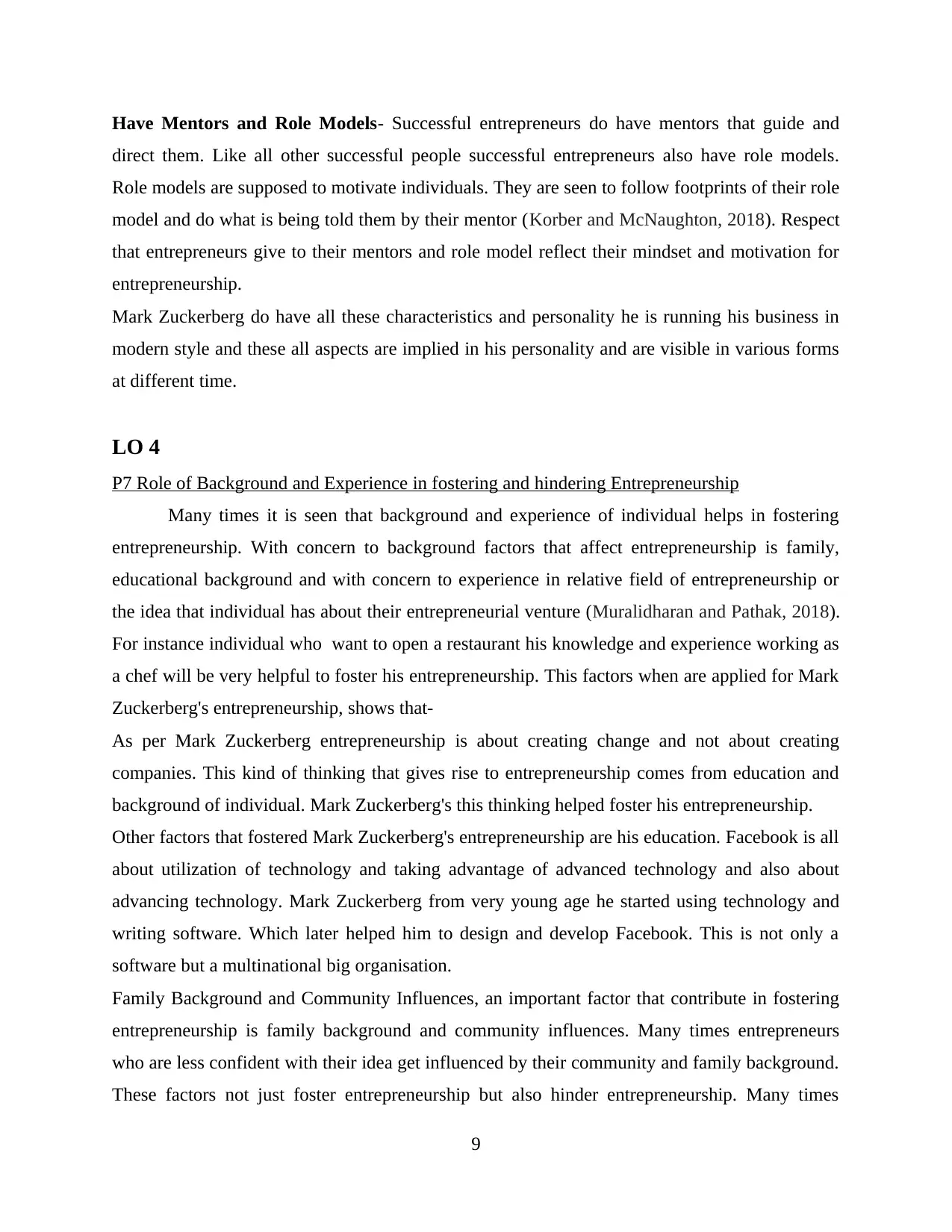
Have Mentors and Role Models- Successful entrepreneurs do have mentors that guide and
direct them. Like all other successful people successful entrepreneurs also have role models.
Role models are supposed to motivate individuals. They are seen to follow footprints of their role
model and do what is being told them by their mentor (Korber and McNaughton, 2018). Respect
that entrepreneurs give to their mentors and role model reflect their mindset and motivation for
entrepreneurship.
Mark Zuckerberg do have all these characteristics and personality he is running his business in
modern style and these all aspects are implied in his personality and are visible in various forms
at different time.
LO 4
P7 Role of Background and Experience in fostering and hindering Entrepreneurship
Many times it is seen that background and experience of individual helps in fostering
entrepreneurship. With concern to background factors that affect entrepreneurship is family,
educational background and with concern to experience in relative field of entrepreneurship or
the idea that individual has about their entrepreneurial venture (Muralidharan and Pathak, 2018).
For instance individual who want to open a restaurant his knowledge and experience working as
a chef will be very helpful to foster his entrepreneurship. This factors when are applied for Mark
Zuckerberg's entrepreneurship, shows that-
As per Mark Zuckerberg entrepreneurship is about creating change and not about creating
companies. This kind of thinking that gives rise to entrepreneurship comes from education and
background of individual. Mark Zuckerberg's this thinking helped foster his entrepreneurship.
Other factors that fostered Mark Zuckerberg's entrepreneurship are his education. Facebook is all
about utilization of technology and taking advantage of advanced technology and also about
advancing technology. Mark Zuckerberg from very young age he started using technology and
writing software. Which later helped him to design and develop Facebook. This is not only a
software but a multinational big organisation.
Family Background and Community Influences, an important factor that contribute in fostering
entrepreneurship is family background and community influences. Many times entrepreneurs
who are less confident with their idea get influenced by their community and family background.
These factors not just foster entrepreneurship but also hinder entrepreneurship. Many times
9
direct them. Like all other successful people successful entrepreneurs also have role models.
Role models are supposed to motivate individuals. They are seen to follow footprints of their role
model and do what is being told them by their mentor (Korber and McNaughton, 2018). Respect
that entrepreneurs give to their mentors and role model reflect their mindset and motivation for
entrepreneurship.
Mark Zuckerberg do have all these characteristics and personality he is running his business in
modern style and these all aspects are implied in his personality and are visible in various forms
at different time.
LO 4
P7 Role of Background and Experience in fostering and hindering Entrepreneurship
Many times it is seen that background and experience of individual helps in fostering
entrepreneurship. With concern to background factors that affect entrepreneurship is family,
educational background and with concern to experience in relative field of entrepreneurship or
the idea that individual has about their entrepreneurial venture (Muralidharan and Pathak, 2018).
For instance individual who want to open a restaurant his knowledge and experience working as
a chef will be very helpful to foster his entrepreneurship. This factors when are applied for Mark
Zuckerberg's entrepreneurship, shows that-
As per Mark Zuckerberg entrepreneurship is about creating change and not about creating
companies. This kind of thinking that gives rise to entrepreneurship comes from education and
background of individual. Mark Zuckerberg's this thinking helped foster his entrepreneurship.
Other factors that fostered Mark Zuckerberg's entrepreneurship are his education. Facebook is all
about utilization of technology and taking advantage of advanced technology and also about
advancing technology. Mark Zuckerberg from very young age he started using technology and
writing software. Which later helped him to design and develop Facebook. This is not only a
software but a multinational big organisation.
Family Background and Community Influences, an important factor that contribute in fostering
entrepreneurship is family background and community influences. Many times entrepreneurs
who are less confident with their idea get influenced by their community and family background.
These factors not just foster entrepreneurship but also hinder entrepreneurship. Many times
9
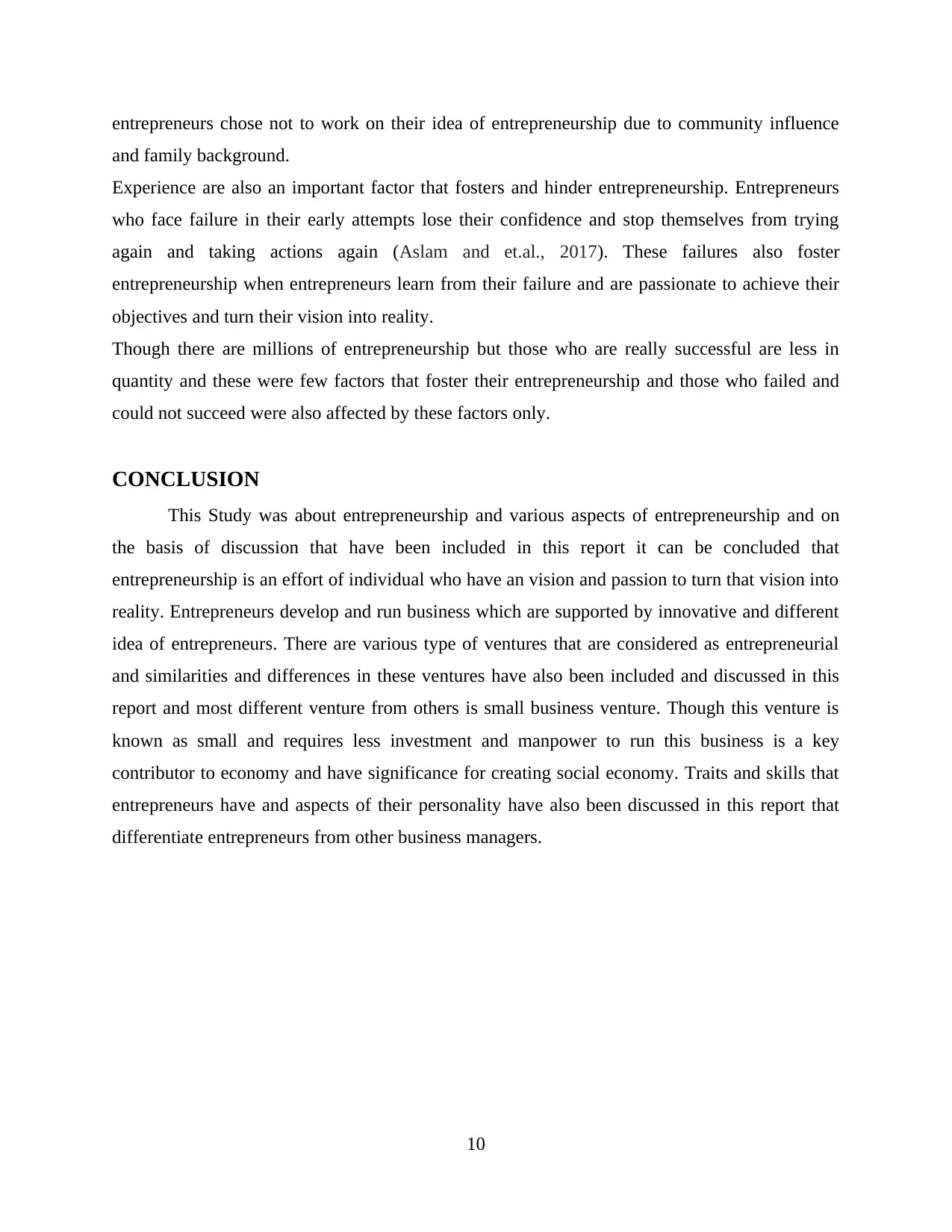
entrepreneurs chose not to work on their idea of entrepreneurship due to community influence
and family background.
Experience are also an important factor that fosters and hinder entrepreneurship. Entrepreneurs
who face failure in their early attempts lose their confidence and stop themselves from trying
again and taking actions again (Aslam and et.al., 2017). These failures also foster
entrepreneurship when entrepreneurs learn from their failure and are passionate to achieve their
objectives and turn their vision into reality.
Though there are millions of entrepreneurship but those who are really successful are less in
quantity and these were few factors that foster their entrepreneurship and those who failed and
could not succeed were also affected by these factors only.
CONCLUSION
This Study was about entrepreneurship and various aspects of entrepreneurship and on
the basis of discussion that have been included in this report it can be concluded that
entrepreneurship is an effort of individual who have an vision and passion to turn that vision into
reality. Entrepreneurs develop and run business which are supported by innovative and different
idea of entrepreneurs. There are various type of ventures that are considered as entrepreneurial
and similarities and differences in these ventures have also been included and discussed in this
report and most different venture from others is small business venture. Though this venture is
known as small and requires less investment and manpower to run this business is a key
contributor to economy and have significance for creating social economy. Traits and skills that
entrepreneurs have and aspects of their personality have also been discussed in this report that
differentiate entrepreneurs from other business managers.
10
and family background.
Experience are also an important factor that fosters and hinder entrepreneurship. Entrepreneurs
who face failure in their early attempts lose their confidence and stop themselves from trying
again and taking actions again (Aslam and et.al., 2017). These failures also foster
entrepreneurship when entrepreneurs learn from their failure and are passionate to achieve their
objectives and turn their vision into reality.
Though there are millions of entrepreneurship but those who are really successful are less in
quantity and these were few factors that foster their entrepreneurship and those who failed and
could not succeed were also affected by these factors only.
CONCLUSION
This Study was about entrepreneurship and various aspects of entrepreneurship and on
the basis of discussion that have been included in this report it can be concluded that
entrepreneurship is an effort of individual who have an vision and passion to turn that vision into
reality. Entrepreneurs develop and run business which are supported by innovative and different
idea of entrepreneurs. There are various type of ventures that are considered as entrepreneurial
and similarities and differences in these ventures have also been included and discussed in this
report and most different venture from others is small business venture. Though this venture is
known as small and requires less investment and manpower to run this business is a key
contributor to economy and have significance for creating social economy. Traits and skills that
entrepreneurs have and aspects of their personality have also been discussed in this report that
differentiate entrepreneurs from other business managers.
10
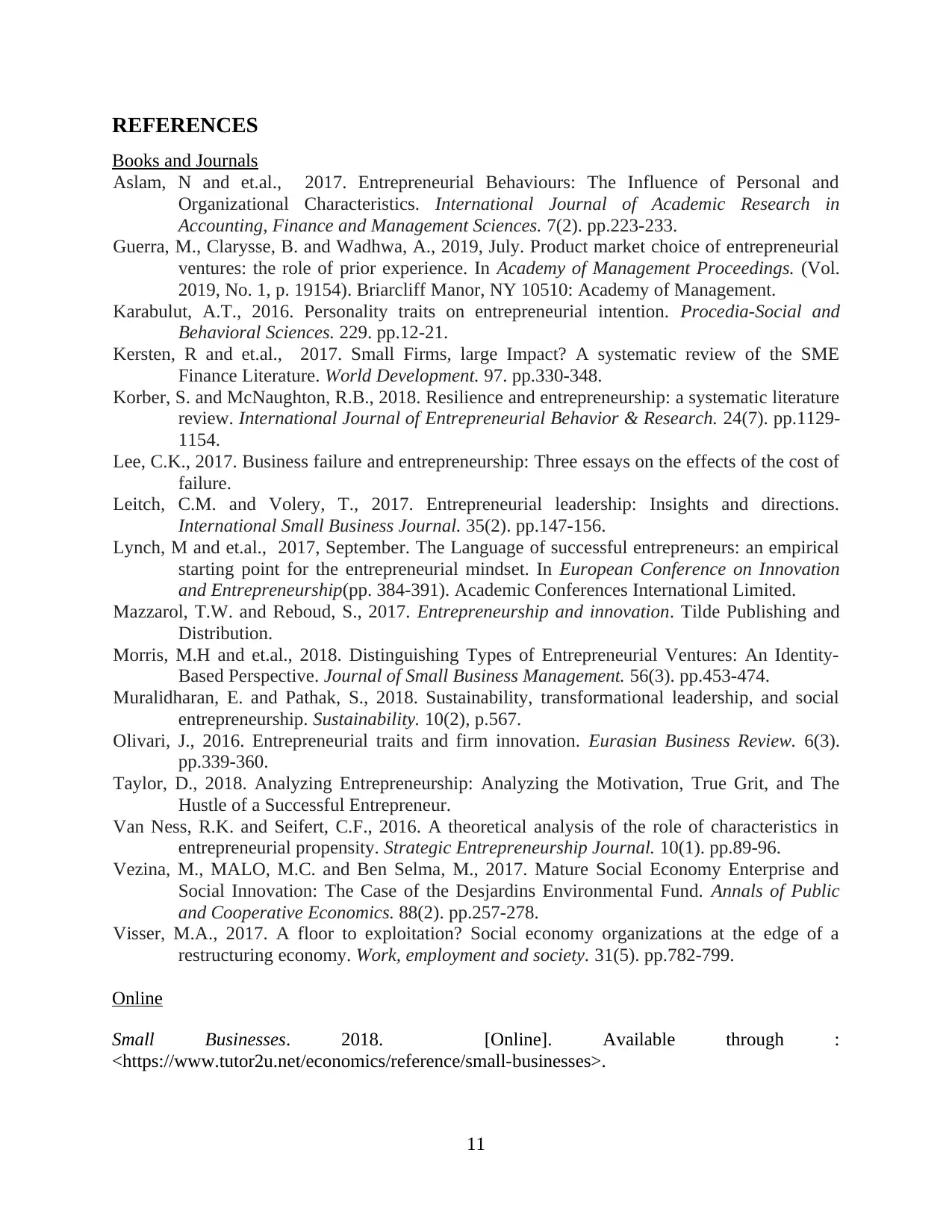
REFERENCES
Books and Journals
Aslam, N and et.al., 2017. Entrepreneurial Behaviours: The Influence of Personal and
Organizational Characteristics. International Journal of Academic Research in
Accounting, Finance and Management Sciences. 7(2). pp.223-233.
Guerra, M., Clarysse, B. and Wadhwa, A., 2019, July. Product market choice of entrepreneurial
ventures: the role of prior experience. In Academy of Management Proceedings. (Vol.
2019, No. 1, p. 19154). Briarcliff Manor, NY 10510: Academy of Management.
Karabulut, A.T., 2016. Personality traits on entrepreneurial intention. Procedia-Social and
Behavioral Sciences. 229. pp.12-21.
Kersten, R and et.al., 2017. Small Firms, large Impact? A systematic review of the SME
Finance Literature. World Development. 97. pp.330-348.
Korber, S. and McNaughton, R.B., 2018. Resilience and entrepreneurship: a systematic literature
review. International Journal of Entrepreneurial Behavior & Research. 24(7). pp.1129-
1154.
Lee, C.K., 2017. Business failure and entrepreneurship: Three essays on the effects of the cost of
failure.
Leitch, C.M. and Volery, T., 2017. Entrepreneurial leadership: Insights and directions.
International Small Business Journal. 35(2). pp.147-156.
Lynch, M and et.al., 2017, September. The Language of successful entrepreneurs: an empirical
starting point for the entrepreneurial mindset. In European Conference on Innovation
and Entrepreneurship(pp. 384-391). Academic Conferences International Limited.
Mazzarol, T.W. and Reboud, S., 2017. Entrepreneurship and innovation. Tilde Publishing and
Distribution.
Morris, M.H and et.al., 2018. Distinguishing Types of Entrepreneurial Ventures: An Identity‐
Based Perspective. Journal of Small Business Management. 56(3). pp.453-474.
Muralidharan, E. and Pathak, S., 2018. Sustainability, transformational leadership, and social
entrepreneurship. Sustainability. 10(2), p.567.
Olivari, J., 2016. Entrepreneurial traits and firm innovation. Eurasian Business Review. 6(3).
pp.339-360.
Taylor, D., 2018. Analyzing Entrepreneurship: Analyzing the Motivation, True Grit, and The
Hustle of a Successful Entrepreneur.
Van Ness, R.K. and Seifert, C.F., 2016. A theoretical analysis of the role of characteristics in
entrepreneurial propensity. Strategic Entrepreneurship Journal. 10(1). pp.89-96.
Vezina, M., MALO, M.C. and Ben Selma, M., 2017. Mature Social Economy Enterprise and
Social Innovation: The Case of the Desjardins Environmental Fund. Annals of Public
and Cooperative Economics. 88(2). pp.257-278.
Visser, M.A., 2017. A floor to exploitation? Social economy organizations at the edge of a
restructuring economy. Work, employment and society. 31(5). pp.782-799.
Online
Small Businesses. 2018. [Online]. Available through :
<https://www.tutor2u.net/economics/reference/small-businesses>.
11
Books and Journals
Aslam, N and et.al., 2017. Entrepreneurial Behaviours: The Influence of Personal and
Organizational Characteristics. International Journal of Academic Research in
Accounting, Finance and Management Sciences. 7(2). pp.223-233.
Guerra, M., Clarysse, B. and Wadhwa, A., 2019, July. Product market choice of entrepreneurial
ventures: the role of prior experience. In Academy of Management Proceedings. (Vol.
2019, No. 1, p. 19154). Briarcliff Manor, NY 10510: Academy of Management.
Karabulut, A.T., 2016. Personality traits on entrepreneurial intention. Procedia-Social and
Behavioral Sciences. 229. pp.12-21.
Kersten, R and et.al., 2017. Small Firms, large Impact? A systematic review of the SME
Finance Literature. World Development. 97. pp.330-348.
Korber, S. and McNaughton, R.B., 2018. Resilience and entrepreneurship: a systematic literature
review. International Journal of Entrepreneurial Behavior & Research. 24(7). pp.1129-
1154.
Lee, C.K., 2017. Business failure and entrepreneurship: Three essays on the effects of the cost of
failure.
Leitch, C.M. and Volery, T., 2017. Entrepreneurial leadership: Insights and directions.
International Small Business Journal. 35(2). pp.147-156.
Lynch, M and et.al., 2017, September. The Language of successful entrepreneurs: an empirical
starting point for the entrepreneurial mindset. In European Conference on Innovation
and Entrepreneurship(pp. 384-391). Academic Conferences International Limited.
Mazzarol, T.W. and Reboud, S., 2017. Entrepreneurship and innovation. Tilde Publishing and
Distribution.
Morris, M.H and et.al., 2018. Distinguishing Types of Entrepreneurial Ventures: An Identity‐
Based Perspective. Journal of Small Business Management. 56(3). pp.453-474.
Muralidharan, E. and Pathak, S., 2018. Sustainability, transformational leadership, and social
entrepreneurship. Sustainability. 10(2), p.567.
Olivari, J., 2016. Entrepreneurial traits and firm innovation. Eurasian Business Review. 6(3).
pp.339-360.
Taylor, D., 2018. Analyzing Entrepreneurship: Analyzing the Motivation, True Grit, and The
Hustle of a Successful Entrepreneur.
Van Ness, R.K. and Seifert, C.F., 2016. A theoretical analysis of the role of characteristics in
entrepreneurial propensity. Strategic Entrepreneurship Journal. 10(1). pp.89-96.
Vezina, M., MALO, M.C. and Ben Selma, M., 2017. Mature Social Economy Enterprise and
Social Innovation: The Case of the Desjardins Environmental Fund. Annals of Public
and Cooperative Economics. 88(2). pp.257-278.
Visser, M.A., 2017. A floor to exploitation? Social economy organizations at the edge of a
restructuring economy. Work, employment and society. 31(5). pp.782-799.
Online
Small Businesses. 2018. [Online]. Available through :
<https://www.tutor2u.net/economics/reference/small-businesses>.
11
Paraphrase This Document
Need a fresh take? Get an instant paraphrase of this document with our AI Paraphraser

Key Small Business Statistics. 2019. [Online]. Available through :
<https://www.ic.gc.ca/eic/site/061.nsf/eng/h_03090.html>.
12
<https://www.ic.gc.ca/eic/site/061.nsf/eng/h_03090.html>.
12
1 out of 14
Related Documents
Your All-in-One AI-Powered Toolkit for Academic Success.
+13062052269
info@desklib.com
Available 24*7 on WhatsApp / Email
![[object Object]](/_next/static/media/star-bottom.7253800d.svg)
Unlock your academic potential
© 2024 | Zucol Services PVT LTD | All rights reserved.




